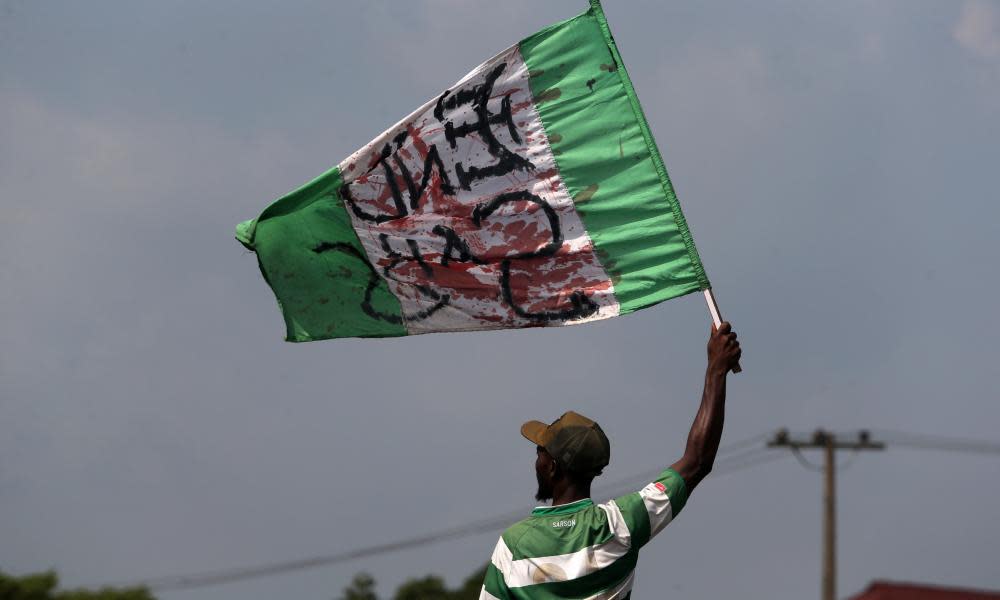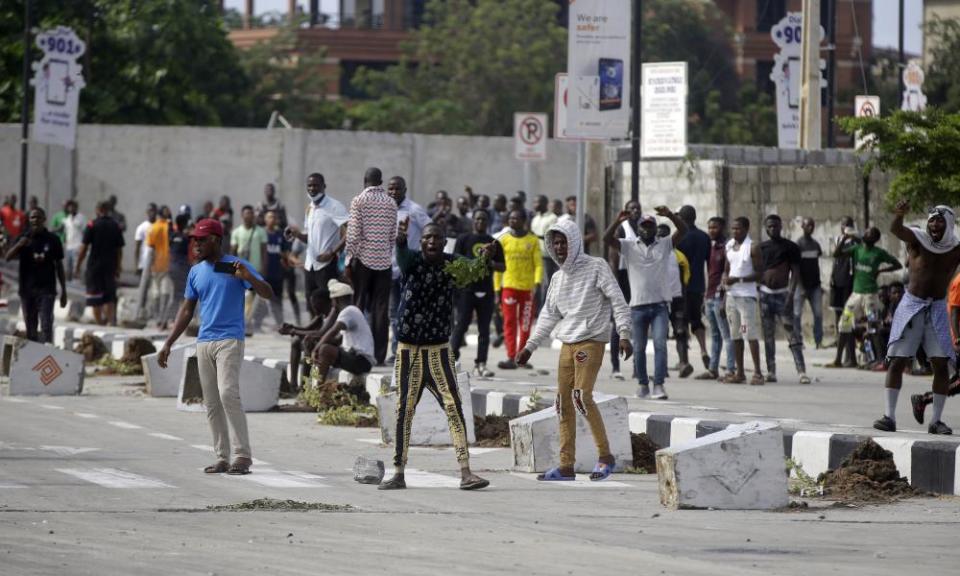'They just acted like animals': anger after protesters shot by security forces in Nigeria

In the minutes before the shooting began, hundreds of mostly young protesters at a toll gate in Lagos, were sitting on the hot ground on a Tuesday evening, waving Nigerian flags, singing the national anthem and defying the government.
Protesters had braced themselves, prepared for when security forces would surely arrive, said 21-year-old Shola Abdul, a kitchen assistant, to enforce a 24-hour curfew across the state that effectively banned mass protests against police brutality.
“We thought if they came and saw we were with our flags, trying to move our country forward, that they would see that,” he said. “But then when they came they just acted like animals.”
Related: Nigeria: protests continue despite curfew and president's plea
The protests began earlier this month, over rampant abuses perpetrated by the notorious special anti-robbery squad (Sars), a police unit with a reputation for corruption and torture, capturing global attention.
According to witnesses, dozens of soldiers disembarked from at least four trucks, flanked by police officers. They approached the scene of a major protest site where more than a thousand people had taken over a toll gate in Lekki, a large district in Lagos Island.
Almost instantly, hundreds were forced to flee as a rain of bullets rang out. First into the air, and then towards the crowds, Shola said. Bodies collapsed to the ground around him as he ran away, he said. “They killed so many innocent souls. I was running away and they were chasing after us. People were dying instantly, as if it was a game.”
Amnesty International said at least 12 people were killed by soldiers and police in the shootings that left many in Nigeria and across the world reeling. Graphic footage of soldiers spraying bullets into fleeing crowds have been shared across social media. Some broadcasted from the scene live on Instagram, watched by more than 150,000 viewers.
The visibility of the carnage, which has since been widely described as the “Lekki Massacre”, has fuelled outrage at the Nigerian government and security forces for clamping down on one of the most striking protest movements in decades in Nigeria.
Democratic US presidential nominee, Joe Biden, and the UK’s archbishop of Canterbury, Justin Welby, were among many around the world to condemn the violence and call for Nigerian authorities to investigate.

Lagos’ governor, Babajide Sanwo-Olu, said the episode was among the “darkest hours from our history as a people,” on Wednesday morning, promising an investigation. Yet he fuelled further outrage by claiming that there were no casualties.
Nigeria’s army, which has also long been accused of rights abuses and mass killings, posted a series of tweets on Wednesday, claimed that reports which accused soldiers of shooting at the scene were false.
Yet on Wednesday, at the scene of the Lekki toll gate, the events of the night before were glaring. Dried pools of blood dotted the ground. Flags, some bloodied, dragged along in the breeze.
A protest site that for almost two weeks was a scene of youthful anger at police brutality and hope at the prospect of change was littered and burnt, with smoke still rising from torched tyres and young men ripping scraps of metal and plastic sheets from the toll gate booths.
Emmanuel Edet, 28, pointed to where he sat on Wednesday before the shooting began. “It was soldiers. Do they think we don’t know what the army look like again?” he said.

He slept in a nearby bush after he fled, too afraid to move, hearing gunshots ring all around until early in the morning. The authorities had completely failed he said and were complicit. “Is this a government that we have? We don’t have a government.”
An Amnesty spokesman, Isa Sanusi, corroborated the claims. “Several people were killed by security forces. We are working on verifying how many.”
At the nearby Reddington hospital, almost 30 men and women, camped outside the hospital gates in the glaring sun, were told to wait for information about loved ones who had been rushed there overnight.
Gloria Nnachi, 28, said her 30-year-old sister, Mabel, was shot in the melee. “I was running and I suddenly realised she wasn’t with me.”
They had gone to the protests together for the first time on Wednesday, finally convinced this was a moment for change in Nigeria that often felt hard to believe in. “Someone found me and told me she was here, so I rushed here. She was shot, they say in the side. I’m just praying she’s alive.”
Thousands have taken to the streets in Nigeria, many for the first time, in what has felt like a seminal moment for a generation bent on change. Many of the protests had become microcosms of a functional state driven by volunteers: couriers provided free water, medics administered aid and case workers helped take details from protesters who had been suffered police brutality.
Emmanuella Fortte, a 23-year-old poet, said the protests had been a place of inspiration. “It shows us what we can achieve together, our generation, pooling our own resources and gifts,” she said. She fled on Tuesday as the shooting began.
Despite the shootings, the protests were just the beginning, she said. “I’m just glad to be home and to rest but soon, we go again. We cannot afford to back down now. Nigeria will never ever move forward if we back down.”


